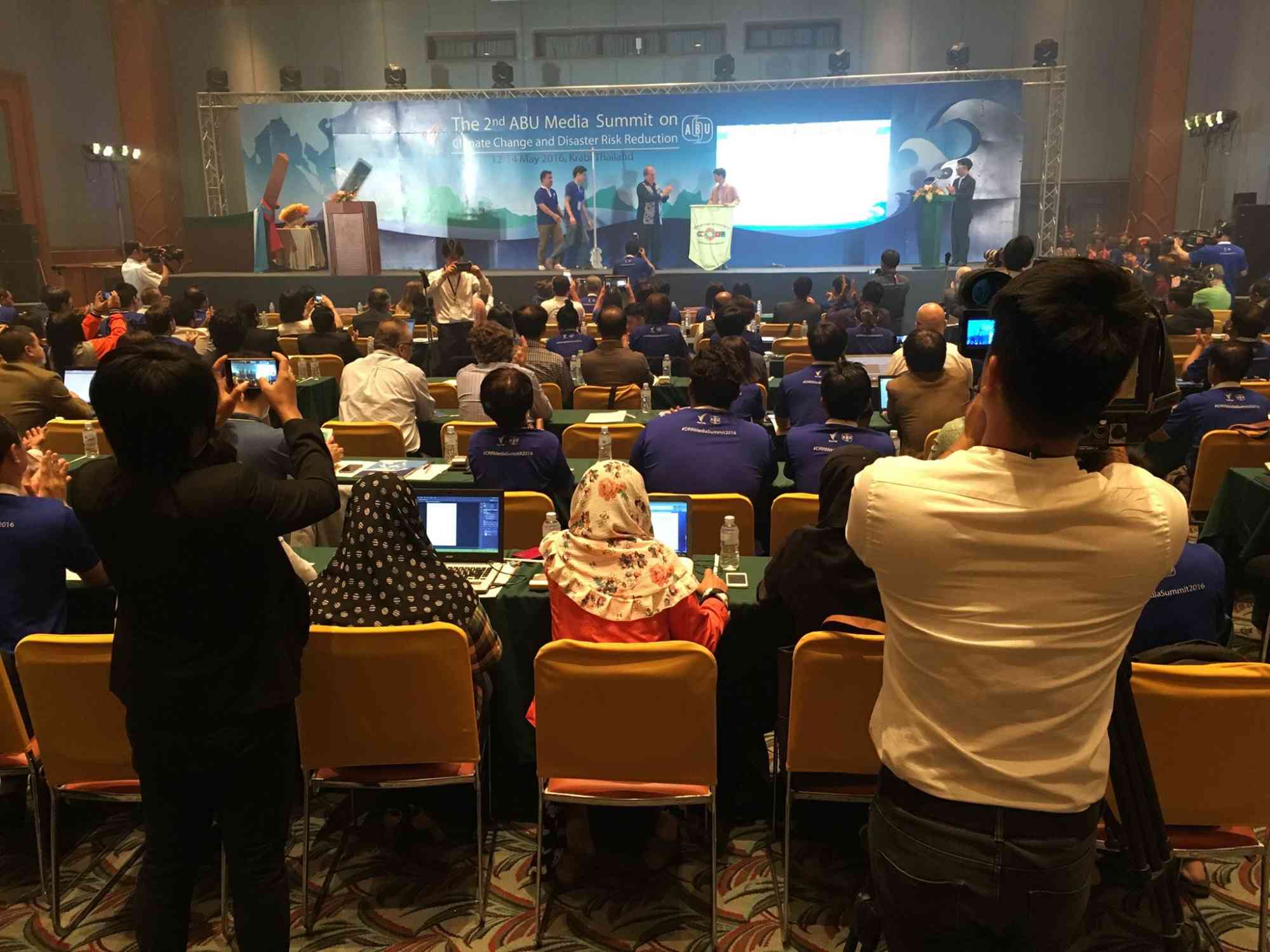ABU Awards on Climate Change & Disaster Risk Reduction
The competition and awards aim to inspire content producers across the Asia-Pacific region and beyond to cover the two most critical issues for the future of mankind: climate change and disaster risk reduction.
Description
The Asia-Pacific Broadcasting Union (ABU) was established in 1964 as a non-profit, non-governmental, non- political, professional association with mandate to assist the development of broadcasting in the region. ABU promotes the collective interests of television and radio broadcasters as well as key industry players and facilitate regional and international media co-operation. This commitment aims at creating incentives for content producers in the region to cover issues of climate change and Disaster Risk Reduction (DRR).
The Awards honors innovative and creative Radio and TV Programmes, which inform and educate audiences about best practices in climate change adaptation and disaster preparedness. The competition is run annually and is attached to the ABU’s Media Summit on Climate Change and Disaster Risk Reduction. A multiple-member jury for the Radio and TV categories select winners. The categories (previous examples include Best Radio Feature on Climate Change, Best TV Feature on Climate Change, Best Radio Feature on Disaster Preparedness and DRR, and Best TV Feature on Disaster Preparedness and DRR) and special awards (previous examples include Best Human Story and Most Promising Young Producer ) are defined on each call.
The ABU Awards on Climate Change and DRR competition is open to factual, drama, and animation features from around the world, submitted by ABU members and non-members. Filmmakers must be supported by their organisations to submit their work. For other details (duration, channels, platforms, etc.), please see each year's call.
Did the Sendai Framework change or contribute to changes in your activities/organization? If so, how?
The Sendai Framework for Disaster Risk Reduction created a shift from managing disasters (reaction) to managing risks (prevention). One result, therefore, is to better understand risks, including climate change, and theirs impacts. Furthermore, the Sendai Framework calls for media “to take an active and inclusive role at the local, national, regional and global levels in contributing to the raising of public awareness and understanding and disseminate accurate and non-sensitive disaster risk, hazard and disaster information, including on small-scale disasters, in a simple, transparent, easy-to-understand and accessible manner.” We believe that the awards are aligned with that call to action.
What led you to make this commitment/initiative?
What was your position before making this Voluntary Commitment / prior to the Sendai Framework?
ABU has been working on climate change and DRR, but the Sendai Framework contributed to boost the importance of this topic while at the same time providing a roadmap for other stakeholders to take action. Among several topics, we believe that climate change and DRR are two of the most critical issues for the future of mankind. As a result, it would be important that content producers across the regions step-up their work. The awards aim at rewarding those efforts.
Deliverables and Progress report
Deliverables
Deliverables are the end-products of the initiative/commitment, which can include issuance of publications or knowledge products, outcomes of workshops, training programs, videos, links, photographs, etc.
During the 2nd ABU Media Summit on Climate Change and DRR in Krabi, Thailand (12 – 14 May 2016), ABU launched the Awards for the best programmes on these issues.
The response to the call for entry was remarkable with 33 entries in the two categories – 21 in the Climate Change category and 12 in the Disaster Preparedness and DRR category.
4 winners were selected among the entries for 4 different awards: (1) Best programme on Climate Change (2) Best programme on Disaster Preparedness and Disaster Risk Reduction (3) Most Promising Programme and (4) Best Story.
For the 3rd ABU Media Summit on Climate Change and Disaster Risk Reduction in Dhaka, Bangladesh, ABU received more than 60 entries for the annual ABU Awards for Climate Change and Disaster Risk Reduction.
There were 36 entries for Television and 25entries for Radio. The competition awarded 6 prizes in 4 categories for both Television and Radio.
Honouring the best Radio and Television programmes on climate change adaptation, disaster preparedness and disaster risk reduction, this competition aims to stimulate content producers across the Asia-Pacific region and beyond to highlight issues critical to the future of mankind through educating their audiences on best practices for climate change adaptation and disaster preparedness.
The winners were announced on 11 May 2017 at a Gala Award Ceremony at Pan Pacific Sonargaon during the ABU Media Summit on Climate Change and DRR in Dhaka, Bangladesh from 10-12 May 2017.
The competition this year had 75 entries from 13 countries in Asia – Pacific and Europe. This is a sign of the growing popularity of the competition and the importance broadcasters put on this topic.
The competition was held in conjunction with the 4rd ABU Media Summit on Climate Change and Disaster Risk Reduction (5 & 6 February 2018, Nadi, Fiji). The winners of the competition were announced at the Gala Awards Dinner on 6 February 2018, Sheraton Fiji Resort, Nadi.
ABU, in collaboration with its global partners, proudly announced the 4th ABU contest on Climate Change and Disaster Risk Reduction.
The Awards encourage inspiring stories from across the globe about addressing the biggest challenge to humanity and solutions to this global threat. This annual contest honours the best Radio and Television programmes on climate change adaptation, disaster preparedness and disaster risk reduction. The contest had two radio and two television categories and two special awards.
The winners were announced on 26 April 2019 at a Gala Award Ceremony during the ABU Media Summit on Climate Action and Disaster Preparedness to be held on 25 – 26 April 2019, Kathmandu, Nepal.
Organizations and focal points
Implementing Organization(s)
Focal points
If a VC's contact information has been hidden, the SFVC team can forward a message.